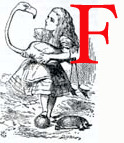 or
much of the last century the term Victorian, which literally describes things
and events in the reign of Queen Victoria (1837-1901), conveyed connotations of "prudish," "repressed," and "old fashioned." Although such associations have some basis in fact, they do not adequately indicate the
nature of this complex, paradoxical age that was a second English Renaissance.
Like Elizabethan England, Victorian England saw
great expansion of wealth, power, and culture. (What Victorian literary form
do you think parallels Elizabethan drama in terms of both popularity and literary
achievement?)
or
much of the last century the term Victorian, which literally describes things
and events in the reign of Queen Victoria (1837-1901), conveyed connotations of "prudish," "repressed," and "old fashioned." Although such associations have some basis in fact, they do not adequately indicate the
nature of this complex, paradoxical age that was a second English Renaissance.
Like Elizabethan England, Victorian England saw
great expansion of wealth, power, and culture. (What Victorian literary form
do you think parallels Elizabethan drama in terms of both popularity and literary
achievement?)
In science and technology, the Victorians invented the modern idea of invention -- the notion that one can create solutions to problems, that man can create new means of bettering himself and his environment.
In religion, the Victorians experienced a great age of doubt, the first that called into question institutional Christianity on such a large scale. In literature and the other arts, the Victorians attempted to combine Romantic emphases upon self, emotion, and imagination with Neoclassical ones upon the public role of art and a corollary responsibility of the artist.
In ideology, politics, and society, the Victorians created astonishing innovation and change: democracy, feminism, unionization of workers, socialism, Marxism, and other modern movements took form. In fact, this age of Darwin, Marx, and Freud appears to be not only the first that experienced modern problems but also the first that attempted modern solutions. Victorian, in other words, can be taken to mean parent of the modern -- and like most powerful parents, it provoked a powerful reaction against itself.
The Victorian age was not one, not single, simple, or unified, only in part because Victoria's reign lasted so long that it comprised several periods. Above all, it was an age of paradox and power. The Catholicism of the Oxford Movement, the Evangelical movement, the spread of the Broad Church, and the rise of Utilitarianism, socialism, Darwinism, and scientific Agnosticism, were all in their own ways characteristically Victorian; as were the prophetic writings of Carlyle and Ruskin, the criticism of Arnold, and the empirical prose of Darwin and Huxley; as were the fantasy of George MacDonald and the realism of George Eliot and George Bernard Shaw.
More than anything else what makes Victorians Victorian is their sense of social responsibility, a basic attitude that obviously differentiates them from their immediate predecessors, the Romantics. Tennyson might go to Spain to help the insurgents, as Byron had gone to Greece and Wordsworth to France; but Tennyson also urged the necessity of educating "the poor man before making him our master." Matthew Arnold might say at mid-century that
the world, which seems
To lie before us like a land of dreams,
So various, so beautiful, so new,
Hath really neither joy, nor love, nor light,
Nor certitude, nor peace, nor help for pain.
but he refused to reprint his poem "Empedocles on Etna," in which the Greek philosopher throws himself into the volcano, because it set a bad example; and he criticized an Anglican bishop who pointed out mathematical inconsistencies in the Bible not on the grounds that he was wrong, but that for a bishop to point these things out to the general public was irresponsible.
Last modified 2 August 2009